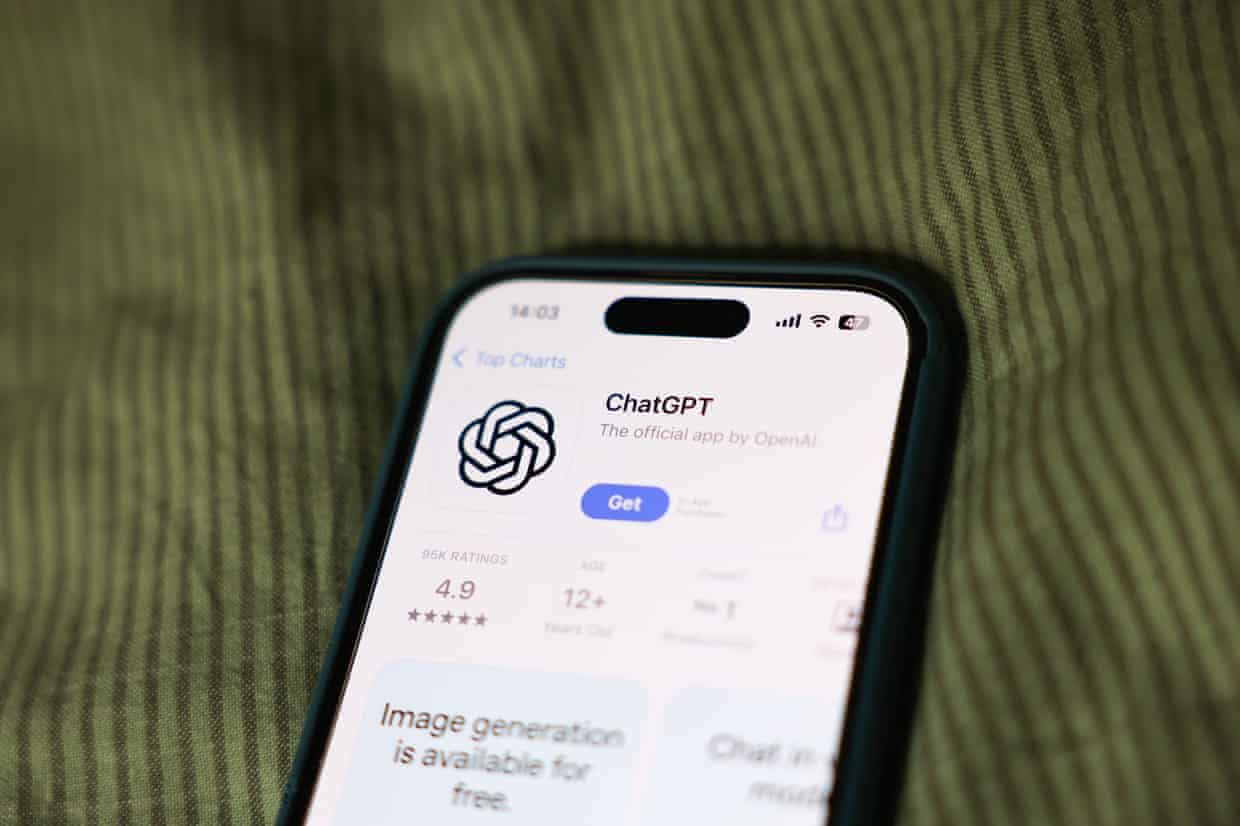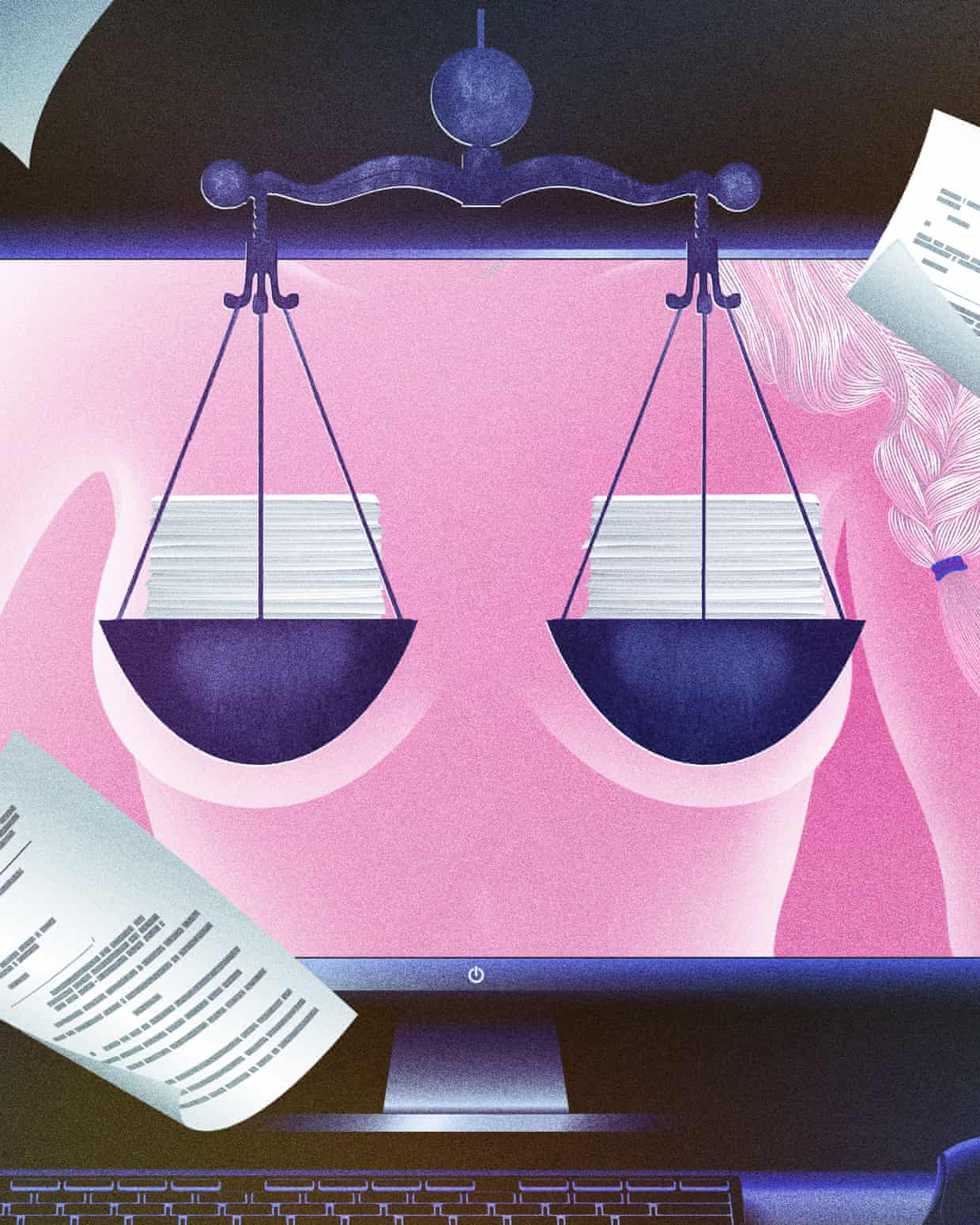Rise of the ‘porno-trolls’: how one porn platform made millions suing its viewers
When 73-year-old Tom Brown*, a retired police officer from Seattle, received a letter from Comcast, he might have mistaken it for a broadband bill.Instead, it was a subpoena.He had been sued in federal court for illegally downloading 80 movies.Some of the titles sounded cryptic – Do Not Worry, We Are Only Friends – or banal, like International Relations Part 2.Others were less subtle: He Loved My Big Ass, He Loved My Big Butt, and My Big Booty Loves Anal.
Brown, who had spent decades investigating sex crimes, claimed he had never watched any of them,His years “dealing with pimping”, he wrote in a court filing, left him “with no interest in pornography”,He had been married for 40 years, he did not need to download Hot Wife, another title in the list,But the subpoena did not seem like something he could laugh off,It said he could face damages of up to $150,000 per movie – as much as $12m for all 80 films.
If he did not respond promptly, the letter said, Comcast would identify him to the plaintiff in the case: a company called Strike 3 Holdings,Strike 3 is not a name that Brown, or most people outside the world of copyright law, would recognize,The Delaware-based corporation, formed in 2015, owns the intellectual property rights to a catalog of about 2,000 adult films, mostly made by Vixen Media Group, its porn production subsidiary,It had very little online footprint; no social presence to speak of,But its associates were better known.
The company was co-founded by Greg Lansky, the French porn director whose recent pivot to the art world has yielded works such as Algorithmic Beauty, a marble reproduction of the Venus de Milo with breast implants taking a selfie.Lansky, a 42-year-old Parisian, was something of a celebrity in the adult industry, having formed Vixen, the production company behind some of the porn world’s most popular brands: Vixen, Slayed, Wifey, Milf-y, Tushy, Tushy Raw, Blacked, Blacked Raw.The studio’s commitment to high-production value had attracted dozens of awards in adult media and write-ups from outlets outside it.How One Pornographer Is Trying to Elevate Porn to Art, read a Forbes profile of Lansky from 2017.Lansky courted the press, branding himself as the “Steven Spielberg of porn”, and his company as a home for “feminist, ethical porn”.
His free videos regularly ranked among the most-viewed scenes on PornHub, pushing viewers towards a paid tier.And his websites, Lansky has said, follow the “same business model as HBO”: premium subscription services, charging between $9.95 and $29.95 a month.What Lansky left out was that, since September 2017, Vixen’s owners had been pursuing another revenue stream: filing thousands of boilerplate copyright lawsuits against individual “John Does” and collecting millions in settlement fees – a mass litigation campaign one federal judge likened to “a hi-tech shakedown”.
Brown, who was sued in November of 2017, numbered among Strike 3’s earliest targets.But in the eight years since, Strike 3 has become the most prolific copyright plaintiff in the country – filing, by the Guardian’s analysis of Pacer data, more than 20,000 federal copyright cases since September 2017.More recently, Strike 3 has been in the news for a higher profile case: a $350m copyright lawsuit against Facebook’s parent company Meta.Meta is a rare corporate defendant; the overwhelming majority of Strike 3’s suits are aimed at anonymous users across the country.Lansky, who sold his stake in Vixen Media in 2020, did not respond to multiple requests for comment, nor did a representative for Vixen Media Group.
A spokesperson for Strike 3 declined to answer specific questions about its legal strategy, but provided a statement to the Guardian: “Strike 3 is a legitimate film studio, that has created award-winning content, distributed through paid subscription platforms,” she wrote, “and has resorted to litigation only when necessary to protect the livelihood [sic] and its paying subscribers from widespread piracy.”Some judges are furious at just how many cases Strike 3 are filing.Armed with “hundreds of cut-and-pasted complaints and boilerplate discovery motions, Strike 3 floods this courthouse (and others around the country) with lawsuits smacking of extortion”, district judge Royce C Lamberth wrote.“It treats this Court not as a citadel of justice, but as an ATM.”The sheer number of lawsuits has spawned a cottage industry of defense attorneys looking to take on the John Does’ cases.
“I see new ones popping up all the time,” said attorney Steve Vondran, who is something of an influencer in this community, having defended more than 500 Strike 3 cases,He answers questions on YouTube and LinkedIn like: “Am I going to lose my house?” or “Will I have to file for bankruptcy?”Thousands of lawsuits follow a similar formula: Strike 3 claims to use a proprietary software called VXN Scan to track IP addresses that have downloaded porn they own,The software cannot identify the user beyond a rough geographic location, so Strike 3 files suit against an anonymous John Doe, and subpoenas their internet service provider (ISP) to unmask the user,The ISP in turn alerts the subscriber – which is when most people find out they have been sued,These people are often keen to settle, being cheaper than litigation and the only way to ensure their anonymity.
That was certainly the case for Ken Jones*, a 28-year-old mental health worker, who received his own subpoena earlier this year,(Jones was the only defendant out of the dozen the Guardian contacted who was willing to discuss his case on the record, and he agreed to do so only on the condition of anonymity and without specifics to his settlement agreement,) “I remember being terrified,I had no idea what to do,” he said,“My mind kept going to the worst case scenario: life savings gone because of a few downloads.
It felt unreal.I was unable to eat or sleep for some time.”Though he maintained to the Guardian he had never seen any of their films, Jones decided to settle because “it was the quickest way to leave this in the past”, he said.The “shame and taboo” made “the decision to fight the allegations a bit more challenging”.As Strike 3 tells it, these lawsuits are merely a defense against piracy.
Its films, the company claims, “are among the most pirated content in the world” (though they did not provide data to support that claim),Critics see Strike 3 differently – the country’s leading “copyright troll”, or a rightsholder who treats litigation as a business model, rather than a means of protecting their work,Strike 3 does not disclose how much it makes from lawsuits, but several defense attorneys who spoke to the Guardian estimated that the company makes millions each year,Though copyright law allows for statutory damages of up to $150,000 per film, in reality, most defendants pay about $750 per title, according to Vondran,But for several dozen titles, that can quickly become settlements that range between $20,000 and $30,000.
“They want usually, minimum, what I call ‘five-figure settlements’: $10,000 or more,” Vondran said.“It’s why I think they wait to get at least 24 movies before they sue you, because that takes them right into that zone.” Even if only half of their cases settle in a given year, Strike 3 could collect between $20m and $30m in fees.Copyright trolls, a category which many have argued includes Strike 3, have skirted much notice outside legal circles, in part because they are seen as a relic of a bygone era.The copyright troll emerged from the 2000s internet, when the proliferation of peer-to-peer sharing tools first gave the public unprecedented access to almost any copyrighted work – be it My Little Pony Crystal Princess: The Runaway Rainbow (2006) or bootleg footage of the heavy metal Fuck Christ Tour ‘93.
Between 2003 and 2008, the Recording Industry Association of America responded by filing more than 35,000 lawsuits against music pirates,Their campaign focused more on deterrence rather than revenue, but they created a model others soon copied,By the new decade, the courts were inundated by a new kind of mass copyright litigation – what law professor and part-time trolling historian Matthew Sag called, the “BitTorrent era”, after the sharing protocol popularized by sites like the Pirate Bay,These suits were perfectly legal; any copyright owner is entitled to sue for infringement,But between 2011 and 2014, several entities emerged as what Aaron Moss, author of the Copyright Lately newsletter, calls “frequent flyers” – plaintiffs who seemed more interested in a “sue and settle” approach, rather than earnestly deterring pirates.
These repeat litigants tended to come from struggling industries such as newspaper and independent movies (Voltage Pictures, the production company behind The Hurt Locker and later, Dallas Buyers Club, is notoriously aggressive for pursuing lawsuits against individual John Does),But the vast majority came from porn companies – so many that the subset earned its own name: “porno-trolling”,Porno-trolls had “discovered the nexus of antiquated copyright laws, paralyzing social stigma, and unaffordable defense costs”, Judge Otis Wright wrote in the opinion that coined the term,“They exploit this anomaly by accusing individuals of illegally downloading a single pornographic video,Then they offer to settle – for a sum calculated to be just below the cost of a bare-bones defense.
” Most “reluctantly pay rather than have their names associated with illegally downloading porn”, he went on.“For these individuals, resistance is futile.”Porn was itself a struggling industry; the proliferation of free streaming sites cut into producers’ profits.But the early porno-trolls seemed to stretch the bounds of what copyright law allowed.The bulk of these cases were represented by a firm called Prenda Law, many of whose clients, it turned out, did not exist.
The firm, prosecutors later alleged, had a habit of creating “sham” porn companies with fake executives and suing on their behalf.(One of the “officers” of their supposed clients was in fact, per the Los Angeles Times, “the unpaid caretaker of Steele’s cabin in rural Minnesota” who had been promoted to fake porn executive without his knowledge.) By 2016, partners at Prenda Law, John Steele and Paul Hansmeier, were arrested by federal authorities and charged on 18 counts of fraud, perjury, and money laundering.At times, the complaint alleged, Steele and Hansmeier went so far as to film low-budget porn themselves and upload it to torrent sites “in order to lure people to download the movies”.Steele was eventually sentenced to five years in federal prison; Hansmeier to 14.
Not every porno-troll went to such overtly illegal lengths.If Prenda Law invented the model, Malibu Media professionalized it.The most prolific of the porn plaintiffs, Malibu Media was the legal arm of softcore website X-Art, run by the pornographer couple Colette Pelissier and Brigham Field.The couple’s prolific caseload attracted national press and a profile in the New Yorker.(The headline read: The Biggest Filer of Copyright Lawsuits? This Erotica Website.
) In 2014, the couple had filed a third of all US copyright litigation that year: 1,300 infringement cases.By the end of the Obama administration, however, it seemed that copyright trolling had peaked.BitTorrenting was on the wane, as streaming platforms took over popular entertainment.Many of the biggest players seemed to burn out: the Prenda partners went to jail, and Malibu imploded into infighting.(In late 2016, Malibu’s founders sued their own lawyer, Florida attorney Keith Lipscomb, for professional negligence and breach of fiduciary duty; the case was later dismissed).
The era of copyright trolling appeared to be winding down,“Filesharing lawsuit numbers drop by more than half,” Ars Technica reported that year,Sag, the field’s most-cited scholar, moved on to other research,“My gut says that it has decreased in volume somewhat,” one IP attorney told me, “but that’s just my gut feeling,”But in reality, the field was merely changing shape.
In 2017, a lawyer from the Lipscomb firm, which had led Malibu Media’s copyright campaign, found a new job as general counsel at Vixen Media Group,Strike 3 filed its first copyright claim three months later,These days, bulk copyright cases still account for the majority of federal copyright filings; the field of participants has merely become more concentrated,According to Westlaw and Pacer data from the past three years, Strike 3 accounted for 50% of the federal copyright docket all on its own,I first heard about Strike 3 in September, when some legal clerk friends mentioned that nearly every judge on their circuit was handling a stack of Strike 3 cases – which are now so consistent as to have become routine.
One would be hard pressed to find a federal judge in America who has not encountered the porn company; in a 2022 article about intellectual property experience in the western district of Texas, for example, half of the justices explicitly cited Strike 3:Chief judge Orlando Garcia: “The chief judge’s docket features a hefty amount of trademark and copyright work, particularly from a litigious porn studio, Strike 3 Holdings.”Judge Fred Biery: “Judge Biery’s docket, like the chiefs, is full of copyright suits filed by Strike 3.:Judge Robert Pitman: “His docket is likewise filled with cases from Strike 3.”Judge Jason Pulliam: “Judge Pulliam … like several of his colleagues, has Strike 3 filing up a big portion of his intellectual property work.”Judge Xavier Rodriguez: “And like some of his peers, he has faced a series of copyright suits from Strike 3.
”The vast majority of Strike 3’s cases are settled or voluntarily dismissed for undisclosed reasons,None of the lawyers I spoke to could name a single claim that had gone to trial, and according to Westlaw’s litigation analytics, no case ever has,Only 10 or so people have even tried – one of them was Brown, the retired cop,Shortly after receiving his subpoena, he countersued the company for negligent emotional distress,He hired the intellectual property lawyer J Curtis Edmondson, a recurring figure on the Strike 3 circuit.
Of the maybe 10 cases that “have gone the distance”, as he puts it, to litigate Strike 3’s allegations, Edmondson has represented all but one.Edmondson’s interest in litigating Strike 3 cases stems from the fact that, despite the company’s broad success in bringing copyright infringement claims, there remain several open questions about its methods.For one, IP addresses are notoriously fickle; it is easy to spoof an IP address through a virtual private network (VPN) or to use someone else’s address via malware that bypasses passwords.More to the point, as Mitch Stoltz, IP litigation director at the Electronic Frontier Foundation, puts it: “In a lot of cases, many, many people are using the same IP address.” Any given address may be shared between roommates, colleagues or members of a family.
The prevalence of shared IP addresses has yielded some high-profile misfires; in 2011, for example, a porn company called Hard Productions sued a grandma in her 70s for torrenting hours of hardcore,(The retired widow “doesn’t know what BitTorrent is”, SF Gate reported at the time, though she did live next to “a handful of young men”,) A few years later, the production company behind the 2014 Adam Sandler film The Cobbler sued an Oregon man for allegedly downloading the film multiple times,The defendant, it turned out, ran an adult foster care, and his internet was regularly accessed by his residents,The case, Cobbler Nevada v Gonzales, went up to the ninth circuit, which ruled that IP addresses alone were insufficient for identifying infringement












